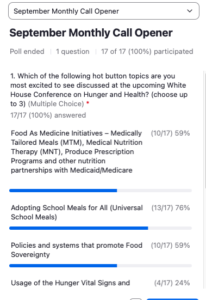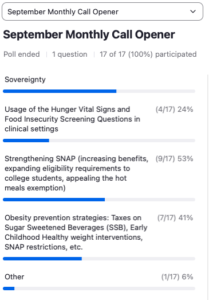Year 1 Monthly Update Calls
February 2022 Monthly Update Call
Agenda| Recording (Passcode: ka^Mj7dU) | Slides
March 2022 Monthly Update Call
Agenda| Recording (Passcode: SX?@e2!v)| Slides
April 2022 Monthly Update Call
Agenda|Recording (Passcode: ELEL&72g) | Slides
May 2022 Monthly Update Call
Agenda | Recording (Passcode: fdc2#BwJ) | Slides | Mentmeter Results
June 2022 Monthly Update Call
Agenda | Recording (Passcode: *U1P.d6X)|Slides | Mentimeter Results
July 2022 Monthly Update Call
Agenda | Recording (Passcode:!Y9B?rX$) | Slides
Additonal materials: State Share Jamboard
August 2022 Monthly Update Call
Agenda | Recording (Passcode:?1Vd@Tid) | Slides
Additional Materials: State Peer Share Chat Log
September 2022 Monthly Update Call
Agenda | Recording (Passcode: 1ubb8%eR)| Slides
Additional Materials: Poll Results 

October 2022 Monthly Update Call
Agenda | Recording (Passcode: 4e^1uXFd) | Slides | Mentimeter results
November 2022 Monthly Update Call
Agenda|Recording (Passcode: Dzxt366#) | Slides
Year 1 SPINE Scoop
Year 1 Special Topic Learning Opportunities (STLO) and Peer Exchange Sessions Recordings & Meeting Materials
February 2022 STLO: BRIC Monthly Webinar “Advancing Food and Nutrition Security through Community Engagement”(Recording not available)
Rising rates of food and nutrition insecurity across the United States, exacerbated by two years of the COVID-19 pandemic, are impacting many communities. Please join Social Innovation and Universal Opportunity Lab as they discuss the root and systemic causes of food and nutrition security, and explore the process of using community engagement as a path forward in building resilience, especially in communities most impacted. They will share guidance on community engagement strategies and SOUL LAB’s Streetwyze platform that can be used to document community member experience. The speaker is Dr. Antwi Akom, Director of the Social Innovation and Universal Opportunity Lab, a joint research lab at University of California San Francisco and San Francisco State University
March 2022 STLO: “SPINE State Action Plan Peer Share and Working Session”
During this session, SPINE states will get an overview of all State Actions Plans and have the opportunity to break into small groups to dive deeper into their SAPs. States will engage in peer sharing on equitable food and nutrition security strategies/activities as well as solicit feedback on their respective SAPs as they work to submit their final plan.
Agenda| Recording (Passcode: 8rB81kW+)| Slides|Post STLO Survey
April 2022 STLO: “Foundations of Health Equity”
During this webinar, participants will learn about the importance of undoing thoughts and beliefs that promote power imbalances in health equity efforts, as well as further connect the dots between racial justice, indigenous sovereignty, and food and nutrition security. Participants will also engage in peer sharing and gain ideas on how to apply health equity into their existing state projects.
Agenda| Recording (Passcode:SPINESTLO0422) | Slides | Post STLO Survey
ADDTIONAL MATERIALS: Urban Case Study | Rural Case Study | April STLO & Office Hour Resources
May 2022 Peer Exchange: “Best Practices for Addressing Equitable Food and Nutrition Security with Historically Marginalized Groups”
During this session, SPINE states, and other programs within NACDD’s Center for Advancing Healthy Communities will be invited to share about their best practices for working with historically marginalized groups that are often overlooked and not included in equitable food and nutrition security discussions. SPINE states will also have the opportunity to ask questions and share what has been working well for them.
Agenda| Recording (Passcode: t4D5Q&%r) | Slides
June 2022 Peer Exchange: “Integrating Community Based Participatory Approaches and Lived Experience in your SPINE Project: Diverse Perspectives“
During this session, SPINE states, and other programs within NACDD’s Center for Advancing Healthy Communities will be invited to share their experiences on incorporating CBP and Lived Experience Approaches into their projects. We will also hear from three subject matter experts representing Academia, the Non-Profit sector, and a State Health Agency on best practices, challenges, and future directions regarding integrating CBP and Lived Experience in program planning, implementation, and evaluation.
Agenda | Recording (Passcode: miJ0J&5N)|Speaker Bios
July 2022 STLO: “It takes a Village – The Importance of Community Input in Developing Equitable Nutrition and Food Security Related Policies and Priorities”
During this Special Topic Learning Opportunity, we will hear from two subject matter experts that represent food policy councils/coalitions in both rural and urban communities. They will share their experiences on how to best engage with and gather community input for Nutrition and Food Security policy and priority development, centering equity and uplifting the voices of those that are most impacted by the issue. Speakers will also participate in a facilitated panel discussion, where attendees will learn how to overcome the challenges that come with gathering community input on food security related policies and priorities, including specific tips on how to engage farmers and other “hard to reach” groups. Attendees will finally have the opportunity to connect with speakers by sharing their own experiences, and asking questions, and will leave with some practical strategies on how to best engage community members in their food and nutrition security policy/strategy/priority efforts.
SPINE STLO July Participant Agenda | Recording (Passcode: RVqpCt9=)|Speaker Bios | Slides | Post STLO Survey
ADDITIONAL MATERIALS: SPINE STLO Gratitude Jamboard | Mentimeter Poll Results
July 2022 Office Hour Materials
Recap Brainstorm Template | Idea to Action Template
August 2022 Peer Exchange “Addressing Nutrition Across the Lifespan: Incorporating Breastfeeding as Part of your Equitable Food Security Efforts”
During this session, SPINE states, and other programs within NACDD’s Center for Advancing Healthy Communities will be invited to engage with three states funded by the Association of State and Territorial Health Organizations (ASTHO) and the SPINE Michigan program to learn about their equitable breastfeeding efforts. Attendees will also share their experiences around incorporating equity into breastfeeding efforts and ask relevant questions.
Agenda | Panelist Bios and State Project Summaries | Recording (Passcode: JZo!Qre9)
September 2022 STLO “Food and Nutrition Security in Rural Communities: Addressing Hunger & Reaching Marginalized Groups”
Individuals living in rural areas face many food access challenges. Rural communities often have limited grocery stores and experience more food insecurity compared to those living in metropolitan/urban areas. Poverty and transportation issues also contribute to food access constraints, further exacerbating food and nutrition insecurity. During the webinar attendees will learn about state and community-based efforts that are improving food access in rural communities and addressing hunger among rural residents. efforts.
Agenda | Slides | Recording (Passcode: YK$2Yv!T)
ADDITIONAL MATERIALS: Jamboard Activtiy Results
October 2022 STLO “Planning for the Long Haul: Understanding and Using the PSAT for Sustaining your SPINE Project”
The CDC’s Healthy Communities Program Sustainability Guide defines Sustainability as “a community’s ongoing capacity and resolve to work together to establish, advance, and maintain effective strategies that continuously improve health and quality of life for all.” Sustainability planning is an important part of a program’s success, because it ensures that are mechanisms in place that can foster lasting change and make a long-term difference in the communities you work in. During this session, we will hear from two subject matter experts of the Program Sustainability Assessment Tool, or the PSAT, developed by the Center for Public Health Systems Science at the Brown School, part of Washington University, St. Louis. Participants will learn about the Sustainability Framework that laid the foundation for the PSAT, as well as how the various domains impact program sustainability. Finally, participants will be guided through the PSAT website and demonstrate how to access and complete the assessment.
Agenda | Slides| Recording (PW: 5=WS3pV.)
Additional Materials: Chat Summary and Miro Results | Poll Result 1 | Poll Result 2 | Steps for Analyzing a Partner | TEMPLATE – Partnership Assessment Tool | TEMPLATE – Stakeholder Analysis Matrix
Other Event and Meeting Recordings from NACCD, BRIC, CDC, and other SPINE Partners
NACCD General Member Webinar, February 2022
“Transforming Narratives: Best Practices & Resources for Designing Inclusive Communications”
During the February 10 webinar, Zunera Mirza, MPH, discussed recommended communication standards to increase inclusivity and acknowledgment of the way words matter and Jana Scoville, MBA, shared the many free health communication resources available at CDC’s State and Community Health Media Center. Vivian Lashley-Bibbs, MPH, NACDD Health Equity Steering Committee and President of the National Association of State Offices of Minority Health (NASOMH) led a panel discussion with Stacey Evans, Communications Specialist, NACDD, and further addressed equity-focused communication strategies.
NACCD’s REDI Alliance Special Screening, February 2022
“The Uncomfortable Truth: A Screening and Q&A with Filmmaker Loki Mulholland”
Loki Mulholland’s film, “The Uncomfortable Truth” is a comprehensive and insightful exploration of the origins and history of racism in America told through a very personal and honest story. Following the live screening, we will have a moderated Q&A session with Mulholland and NACDD Senior Director of Health Equity Robyn Taylor.
BRIC Monthly Webinar, April 2022
“Understanding Dimensions of Diversity for More Effective Community Engagement”
The session focused on examples of what health disparities can look like for 2 specific communities: people with disabilities and the LGBTQIA community. Antonio Cortes, PhD, kicked us off by providing critical definitions of diversity, equity, and inclusion, health disparities while sharing a framework illustrating the different dimension of diversity. Participants broke into small groups to discuss challenges, community engagement, advocacy, partnership and strategies to serve these populations.
BRIC/SPINE Monthly Webinar, May 2022
“Mental Health, Social Isolation, Food and Nutrition Security. What is the Connection?”
This month’s learning opportunity focuses on the theme, mental health is public health. Mental health is more than just a disorder, as seen by the impact of the COVID-19 pandemic on increased stress, anxiety, and depression. Mental health impacts individuals’ physical, mental, and social well-being, making it integral to achieving overall public health goals. In this month’s webinar, Mental Health America will explore mental health as a public health issue and discuss the relationship between mental health and social determinants of health including food and nutrition security, safe physical activity access, and social connectedness. We will hear from two State Health Departments on how they have approached and integrated mental health into their public health work using a policy, systems, and environmental change lens. You can access the slides on the BRIC Webinars Webpage
BRIC/SPINE Monthly Webinar, June 2022
Join us for a webinar to discuss the importance of youth and intergenerational programming and practices in public health and how they can be used to promote social connectedness and food and nutrition security, and elevate youth voices. Hear from speakers who will share best practices for engaging youth and older adults in public health programming and learn how you can launch and integrate intergenerational activities into your existing initiatives. You can access the recording and slides on the BRIC Webinars Webpage. Passcode(Passcode for recording: BIGSMILES1!)
BRIC Monthly Webinar, July 2022
“Using Data Walks as an Approach to Engage Community and Advance Equity”
Please join us for brief presentations and discussion about collaborative processes that engage residents, public health practitioners, researchers, and other local stakeholders to engage community and achieve a deeper understanding of community health data trends through a lens of lived experience. This session will be facilitated by the BRIC technical assistance team and feature speakers from the Urban Institute, the Tamarack Institute, and the South Carolina Department of Health and Environmental Control. The speakers will describe the Data Walks process and highlight how this process has been used in urban and rural communities to engage residents and local partners to help interpret public health data. We welcome other state and local practitioners to join the conversation and share your own data equity approaches. You can access the recording and slides on the BRIC Webinars Page.
BRIC Peer Exchange, August 2022
“Examining Whiteness in the Food System” – Implications for BRIC Work
In addition to viewing the slide deck linked above, we encourage you to watch the webinar recording or the 15-min video blog if you are short on time. There is also a great report out of Duke’s World Food Policy Center, North Carolina Food Resilience Strategy
